
| RELX | -0.86% | 46.37 | $ | |
| SCS | -3.01% | 10.97 | $ | |
| NGG | -3.3% | 56.13 | $ | |
| AZN | 0.64% | 67.01 | $ | |
| BTI | -2.34% | 35.9 | $ | |
| GSK | -1.99% | 33.09 | $ | |
| RIO | 0.36% | 58.84 | $ | |
| RBGPF | 100% | 60.49 | $ | |
| BP | 0.54% | 31.29 | $ | |
| CMSC | -0.79% | 22.92 | $ | |
| BCE | -2.92% | 22.96 | $ | |
| BCC | -1.31% | 115.88 | $ | |
| RYCEF | -0.42% | 7.07 | $ | |
| VOD | -1.99% | 8.05 | $ | |
| CMSD | -0.65% | 23.25 | $ | |
| JRI | -1.16% | 12.08 | $ |

Majority of Britons back keeping monarchy: survey
Most Britons want to keep the monarchy but King Charles III lacks support from young people, a new poll suggested on Monday, less than two weeks before his coronation.
Fifty-eight percent of respondents backed retaining the monarchy, compared to 26 percent in favour of an elected head of state and 16 percent who "don't know", according to the YouGov survey.
But the poll, commissioned by the BBC before Charles's May 6 coronation, indicated that only about a third of young people support the monarchy while 38 percent would prefer an elected head of state.
They showed broad indifference towards the institution, with more than three-quarters of 18-24 year-olds saying they were "not interested" in the royal family.
Support for the royals was greatest among older people, with 67 percent backing among those aged 50-64, and 78 percent in the over-65s.
Meanwhile, 45 percent of the 4,592 people surveyed said they think Charles is out of touch with the experiences of the British public, versus 36 percent viewing him as "in touch".
Charles, 74, founded the Prince's Trust in the 1970s while heir to the throne. By 2020 it had helped one million young people aged 11-30 from disadvantaged backgrounds.
He has also been a lifelong supporter of protecting the environment and fighting against climate change.
But as Britons grapple with the worst cost-of-living crisis in a generation, the financial burdens of the royal family also appear to be weighing on their popularity amongst young people.
There has been grumbling about the cost of the coronation, which is paid for by the government, given the current financial pressures on ordinary people.
Costs for the event are not expected until after the event, but the last, of Queen Elizabeth II in 1953, cost the equivalent of £20.5 million.
The criticism is part of wider questions about the transparency of royal finances, and plans by republicans to protest at the coronation.
While 54 percent in the BBC-commissioned survey said they thought the family were "good value", more youngsters responded that they were bad value (40 percent) than good (36 percent).
A.Mariani--LDdC



